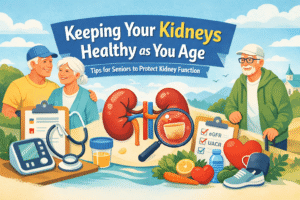One of the strongest risk factors for kidney disease is hypertension, or high blood pressure. If unmanaged, it can become a dangerous condition called hypertensive nephropathy, which leads to kidney damage.” This highlights the need to manage hypertension to protect kidney function.
Hypertension and its Effect on Kidneys
The kidneys are fundamental to blood pressure control by removing extra sodium and fluids from the body. High blood pressure can injure the little blood vessels in the kidneys, which the kidneys need to filter waste. This damage can progress to chronic kidney disease (CKD) and, in some cases, end-stage renal disease (ESRD).
Southern Oklahoma Kidney Center and the Management of Hypertension
We refer to a dietitian with expertise in hypertension, and we collaborate with your primary care provider for optimal hypertension management if you are at risk for, or have, kidney disease at Southern Oklahoma Kidney Center. We will develop a tailored mix of treatment options with you to try to help keep your blood pressure in control and prevent kidney damage.
Lifestyle Changes to Keep Blood Pressure in Check
Healthy lifestyle changes are key to managing hypertension.
- Dietary Modifications: A healthy diet low in sodium and high in fruits and vegetables may assist in decreasing hypertension. One diet that really delivers in this area is called the DASH (Dietary Approaches to Stop Hypertension) diet.
- Exercise: Regular physical activity improves heart health and keeps your weight in check, which is also important for maintaining control of blood pressure.
- Weight Control: Losing excess weight takes pressure off the heart and kidneys, which helps with blood pressure regulation.
- Avoiding Alcohol Because of Tobacco: Reducing alcohol consumption and quitting smoking can significantly lower blood pressure and improve overall health.
Hypertension: Medical Interventions
Lifestyle strategies may not be enough, and medications may need to be started to better control blood pressure. ACE inhibitors and angiotensin II receptor blockers (ARBs) are prescribed for many patients with hypertension and associated kidney disease because they dilate the blood vessels and relieve stress on the kidneys.
Surveillance and Routine Examinations
Frequent checks of blood pressure and kidney function are crucial. Regular check-ups help healthcare professionals evaluate kidney function, update treatment plans, and identify potential early signs of kidney damage.
Keeping hypertension under control is essential to preserve the function of the kidneys and to slow the progression of kidney disease. However, through lifestyle changes, proper medications, and regular monitoring, the risk of high BP-related kidney damage can be minimized. We are dedicated to ensuring renal health and holistic wellness, and we are at the forefront of expert care and tailored treatment regimens.




